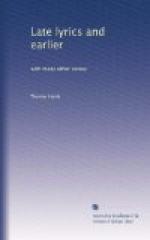AN OLD LIKENESS (RECALLING R. T.)
Who would have thought
That, not having missed her
Talks, tears, laughter
In absence, or sought
To recall for so long
Her gamut of song;
Or ever to waft her
Signal of aught
That she, fancy-fanned,
Would well understand,
I should have kissed her
Picture when scanned
Yawning years after!
Yet, seeing her poor
Dim-outlined form
Chancewise at night-time,
Some old allure
Came on me, warm,
Fresh, pleadful, pure,
As in that bright time
At a far season
Of love and unreason,
And took me by storm
Here in this blight-time!
And thus it arose
That, yawning years after
Our early flows
Of wit and laughter,
And framing of rhymes
At idle times,
At sight of her painting,
Though she lies cold
In churchyard mould,
I took its feinting
As real, and kissed it,
As if I had wist it
Herself of old.
Her apotheosis
“Secretum meum mihi”
(Faded woman’s song)
There was a spell of leisure,
No record vouches when;
With honours, praises, pleasure
To womankind from men.
But no such lures bewitched me,
No hand was stretched to raise,
No gracious gifts enriched me,
No voices sang my praise.
Yet an iris at that season
Amid the accustomed slight
From denseness, dull unreason,
Ringed me with living light.
“SACRED TO THE MEMORY” (MARY H.)
That “Sacred to the Memory”
Is clearly carven there I own,
And all may think that on the stone
The words have been inscribed by me
In bare conventionality.
They know not and will never know
That my full script is not confined
To that stone space, but stands deep lined
Upon the landscape high and low
Wherein she made such worthy show.
TO A WELL-NAMED DWELLING
Glad old house of lichened stonework,
What I owed you in my lone work,
Noon and night!
Whensoever faint or ailing,
Letting go my grasp and failing,
You lent light.
How by that fair title came you?
Did some forward eye so name you
Knowing that one,
Sauntering down his century blindly,
Would remark your sound, so kindly,
And be won?
Smile in sunlight, sleep in moonlight,
Bask in April, May, and June-light,
Zephyr-fanned;
Let your chambers show no sorrow,
Blanching day, or stuporing morrow,
While they stand.
THE WHIPPER-IN
My father was the whipper-in, —
Is still—if I’m
not misled?
And now I see, where the hedge is thin,
A little spot of red;
Surely it is my father
Going to the kennel-shed!




